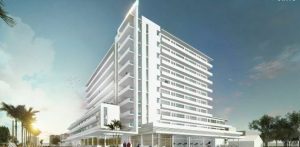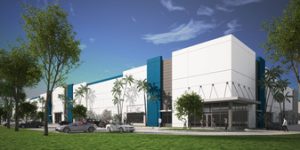Could IBM’s former office complex in Boca Raton become more than just a hub of technology — and become a hub for housing, too?
Sources say the Boca Raton Innovation Campus , as it is now called, is being marketed for sale by its current owners. This time, potential buyers are taking a look at doing something more with the Boca Raton site than using it only for leased office space. The site could become a mixed-use complex featuring apartments, shops and a hotel, too.
Plans are afoot to seek the city’s OK to build 720 apartments, 20 townhomes, a 120-room hotel and 81,000 square feet of retail space. The property’s owners are San Francisco-based Farallon Capital Management and New York-based Next Tier HD, which bought the property for an undisclosed sum in January 2015. They are said to be working closely with Boca Raton to allow new zoned uses for the 130 acres on which the property sits.
The move is in line with changes made to the nearby Park at Broken Sound, formerly the Arvida Park of Commerce, where the city has allowed homes and shops to built on land that formerly was limited to light industrial research buildings. The city is placing a greater emphasis on housing that sits near public transportation, and the Boca Raton Innovation Campus has a Tri-Rail station directly to its east.
The iconic 1.7 million-square-foot building that once housed IBM’s software and hardware developers could remain intact, or parts of it could make way for other uses. But it’s unlikely large portions of the old IBM building will be felled.
In addition to its historic value, the complex houses a range of corporate tenants with varying lease lengths. Tenants include Bluegreen Corp., Tyco Integrated Security, TransUnion, Modernizing Medicine and MDVIP.
Since the purchase, Next Tier and its on-site broker, CBRE, have brought occupancy to 71 percent from 55 percent. More deals are in the works, too. A broker for Eastdil Secured, which is marketing the property, could not be reached for comment.
“Although the property has historic value, it does not have a historic designation from either the city of Boca Raton which could limit any change to the buildings or the National Register of Historic Places, according to Susan Gillis, Boca Raton Historical Society curator. “But we would like it to.”
The former IBM building is special to fans of both technology and architecture. In December 1966, IBM announced its purchase of 550 acres west of what is now Interstate 95, south of Yamato Road and east of Military Trail. IBM was the first company to build an industrial site in the scrubland of the west, according to the Boca Raton Historical Society.
The building was designed by Marcel Breuer and Thomas Gatje and featured buildings for administration and product testing, development labs, manufacturing and distribution. The buildings feature a unique Y-shaped design, considered an engineering marvel for its day.
“The building is considered an oustanding example of the Brutalist style of architecture,” Gillis said.
The building isn’t just important for its aesthetic elements. The architects also designed the structure to withstand a Category 5 hurricane.
“They put a lot of thought into those buildings, way back when,” said Michael Masanoff, who was part of the Blue Lake Ltd. group that bought the building from IBM in 1996.
On March 31, 1970, 3,500 people, led by IBM chairman Thomas J. Watson Jr., attended the ceremonial dedication of the new facility, according to IBM’s website.
Over time IBM dominated the city, and “wild ducks” flew high in Boca Raton. That was the nickname of a small group of engineers, marketing experts and communications specialists led by Philip “Don” Estridge. They designed the first personal computer, which was introduced in 1981. (On Aug. 2, 1985, Estridge died in the crash of Delta Flight 191 in Dallas. A former IBM building became the Don Estridge High Tech Middle School, named in his honor.)
By the mid-1980s, IBM employed nearly 10,000 people at this site and in office buildings clustered in the area. But by the end of that decade, IBM had stopped manufacturing at the site, moving this function to North Carolina. Then the software development team moved to Texas.
With employment dwindling, IBM sold the property for $46 million in 1996. The property became the Blue Lake Corporate Center, then the T-Rex Corporate Center, when an ownership group bought it from the Blue Lake group for $138.65 million in 2000.
Private equity fund Blackstone Group bought the site for $192.7 million in 2005 and renamed it the Boca Corporate Center & Campus, until Farallon and Next Tier renamed it the Boca Raton Innovation Campus, or BRIC.
In the years since IBM left the building, the area around the complex has matured. A lively strip of retail shops now fronts the building along Yamato Road, and a new interstate interchange is nearly complete on the south side of the property, at Spanish River Boulevard.
More importantly, demand for in-town housing is huge, especially since the city is virtually out of space for new homes, leading many developers to snap up golf course to transform into houses.
Owners of the Boca Raton Innovation Campus have worked to brighten up the old office interiors with renovations and amenities, including adding a fitness center and daycare and renovating the conference room and lobbies. And since no one is building new office space in Boca Raton, existing office space is becoming scarce, too.
Also helping boost the property’s allure, particularly on the heels of this hurricane season: The building has its own backup generator, installed by the Blue Lake group years ago.
Source: Palm Beach Post




